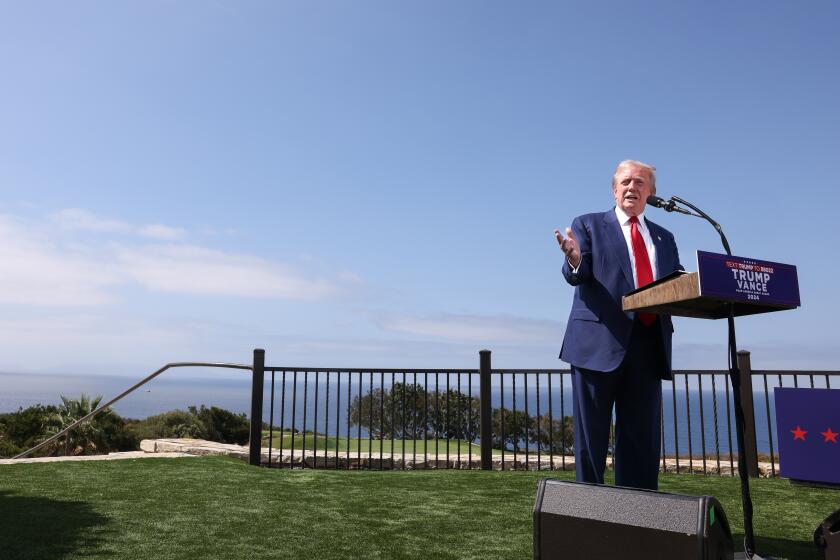Democrats Make North Dakota a Primary Priority
After a weekend debate in snow-draped Iowa, Democrat Rep. Dick Gephardt plunged northward into the frigid High Plains to forage for votes in a place where sightings of presidential candidates are about as common as balmy days in January.
On a bone-chilling Sunday night in Fargo -- as subzero temperatures threatened to stall the Winnebago that carried him from stop to stop -- Gephardt found a warm reception from union loyalists and party activists mobilizing for one of the more remote early battles in the 2004 nominating contest.
Rival Howard Dean followed him Monday night, and more than 800 braved the cold to hear him speak at a local hotel.
Retired Gen. Wesley K. Clark and, in a separate appearance, a surrogate for Sen. John F. Kerry of Massachusetts are due in North Dakota this week -- further proof that in this year’s compressed schedule of primaries and caucuses, candidates have more than just Iowa and New Hampshire on their minds.
North Dakota is one of seven states with contests on Feb. 3. In this unlikely political front, just a handful of delegates to the national convention are at stake in caucuses that party officials expect to draw no more than 20,000 participants. But candidates are coming nonetheless, because even victory in a sparsely populated state can help them claim momentum.
“You have to win as many states as you can on Feb. 3 to prove that you’re a vote-getter,” said John Marshall, the director of Clark’s campaign here. “So North Dakota fits into the mix.”
North Dakotans, who have never before had much of a voice in choosing a presidential nominee, seem flattered by the attention, though perhaps unschooled in their role in a political pageant that Iowans, a few hundred miles to the southeast, know by heart.
“They know Feb. 3 is important in North Dakota, but they’re not sure what they’re supposed to do at this point,” said Vern Thompson, executive director of the state Democratic Party.
Thompson is working feverishly to improve turnout; four years ago, the Democratic caucuses drew only about 2,000 partisans and occurred well after Al Gore had clinched the presidential nomination. Before that, the state party held a little-noticed primary in 1996.
“This is the first time that North Dakota has had a chance to be a player on the national scene,” Thompson said.
Although its three-member congressional delegation is entirely Democratic, North Dakota has long voted Republican for president.
Gore never bothered to campaign here in 2000, embittering local Democrats, and George W. Bush easily carried the state in the general election.
No one is predicting that the eventual Democratic nominee in 2004 will spend much time here either, come summer or fall. But at least the candidates for the nomination are making a stir in the dead of winter.
Clark is scheduled to pay his second visit Saturday when he keynotes a Democratic Party dinner in Bismarck.
Dean’s visit here also was his second, following a stop in 2002.
During his speech Monday, the former Vermont governor was rewarded with six standing ovations during the course of his 30-minute speech.
“Thank you! My goodness, wow!” Dean said as he came into the overflowing ballroom. “This is what I call a warm North Dakota welcome!”
Kerry was dispatching retired Lt. Gen. Claudia Kennedy to help him build support in the state this week.
Gephardt, a Missouri congressman, has offices in Bismarck and Fargo and has come to the state twice. In addition, his son, Matt, campaigned here in December.
Matt Gephardt’s far-north swing became a running joke recently when a voter in Iowa asked the elder Gephardt why, if he loved his son, would he send him to Fargo in December. Gephardt got big laughs retelling that story to Iowa audiences.
For all the jokes, though, North Dakota figures in Gephardt’s strategy. He hopes a win in Iowa will propel him to victory here, much as his 1988 Iowa win in that year’s presidential race helped him capture South Dakota before losses in other states ended his candidacy.
If Gephardt takes North Dakota on Feb. 3 along with South Carolina, Oklahoma and his native Missouri -- all states he has targeted -- he would have won more than half the day’s contests.
Gephardt, as he campaigned in Fargo on Sunday, met with sugar beet growers who fear that the recently negotiated Central American Free Trade Agreement will allow imported sugar to undercut domestic producers. The sugar industry generates about $2 billion a year in local revenue, officials said, and employs thousands of workers.
Gephardt, an opponent of the new trade agreement, told the workers he was on their side.
Turning up his rhetoric in a rally at a union hall, Gephardt promoted his plan for near-universal health care and railed against Bush’s tax cuts, which he called a giveaway to the wealthy, with just a “little bitty, puny tax cut” for the average family. His phrase mocked language the president had used this year to describe a tax cut package smaller than what he had requested from Congress.
Asked about the effort to get to North Dakota, Gephardt told reporters: “When you run for president, you’ve got to work. And you’ve got to be in a lot of different places at one time. Pleased to be here tonight.”
More to Read
Get the L.A. Times Politics newsletter
Deeply reported insights into legislation, politics and policy from Sacramento, Washington and beyond. In your inbox three times per week.
You may occasionally receive promotional content from the Los Angeles Times.










